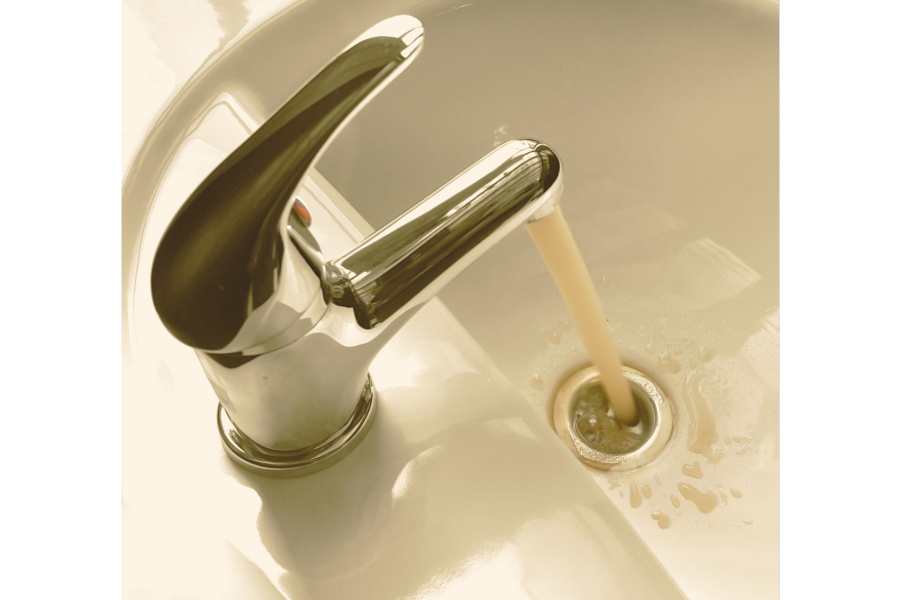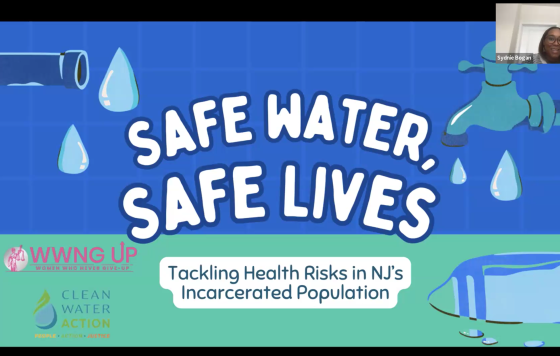
Introduction
In New Jersey, prison populations bear a unique burden from pollution, often lacking the agency to change their environments. As community advocates, Clean Water Action’s NJ Environmental Justice Organizer, X Braithwaite, and Sydnie Bogan, Graduate Research Assistant at Kean University and Project Coordinator for Women Who Never Give Up have sought ways to bring about change in these facilities. Our last blog post discussed some of the alarming data collected by Sydnie:
- Health Risks from Pollution: New Jersey’s 13,196 incarcerated individuals face exposure to hazardous substances like lead and arsenic, with half of the prison facilities located on or near contaminated sites.
- Demographic Disparities and Mortality Rates: Among the incarcerated population, 59% are African American and 14% are Hispanic. New Jersey has the highest mortality rate during COVID-19 within their incarcerated population, exacerbated by overcrowding and inadequate ventilation.
- Climate Change Vulnerabilities: Rising temperatures in New Jersey lead to unsafe conditions in prisons, with cells often reaching 94°F during summer heatwaves, worsening respiratory issues.
- Inadequate Living Conditions: Inspections reveal unsafe living conditions, including sanitation issues and poor air quality, with incarcerated individuals suffering respiratory problems during summer wildfires.
Empowering Voices: Water Quality Awareness Session
“It’s difficult as prisoners when you wake up and your water smells like gasoline. So, you automatically panic because you don’t have the ability to substitute the water that you’re drinking with something else.” - Phillip Dixon
On October 8th, we hosted an engaging information session for community members and environmental experts to share their experiences addressing these critical issues. The session included a panel of previously incarcerated individuals who shared their firsthand accounts of water quality challenges while in custody. Many expressed fear and concern over the safety of water used for drinking and personal hygiene. Panelist Phillip Dixon expressed, “It’s difficult as prisoners when you wake up and your water smells like gasoline. So, you automatically panic because you don’t have the ability to substitute the water that you’re drinking with something else.” In most of the facilities surveyed, incarcerated people are often limited to purchasing 1-2 cases of water a month, which is about one and a half bottles a day.
The discussion culminated in a call to action for the New Jersey Department of Environmental Protection (NJDEP) and the Department of Corrections (DOC) to prioritize health protections for those incarcerated. Notable concerns included water quality issues at the Garden State Youth Correctional Facility, which have gone unaddressed for far too long.
In case you missed out or would like to share the webinar with others please check out this video recording of the webinar:
Passcode: zs2D=7Sw
Building Bridges with the Returning Citizens Support Group
We also had the privilege of meeting with the Returning Citizens Support Group (RCSG) based in Newark, NJ. Founded by Edwin "Chino" Ortiz, Carmelo "Melo" Ortiz, and Al Tariq Witcher, RCSG provides essential re-entry support and wrap-around services to systems-impacted communities. Since its inception in 2017, RCSG has effectively served over 5,000 individuals, not only reducing recidivism but empowering them to thrive as business owners, college graduates, and community leaders.
During our meeting, we heard inspiring success stories but also acknowledged the challenges faced by returning citizens. Sydnie and X shared their findings, and the conversation highlighted the importance of community support in overcoming obstacles and facilitating meaningful change.
Advocating for Legislative Change
With support from the community and organizations, we can push for necessary reforms. One such model is the Environmental Health in Prisons Act, recently introduced by U.S. Senator Ed Markey (MA) and Congressperson Ayanna Pressley (MA-7). This act aims to address hazardous environmental conditions in federal prisons and is supported by the Prison Policy Initiative.
Key provisions of the act include:
- Stricter monitoring and reporting on various pollutants and environmental hazards.
- Ensuring incarcerated individuals are informed about potential environmental dangers.
- Funding feasibility studies and pilot programs to mitigate environmental harm.
- Whistleblower protections for individuals raising concerns about facility conditions.
The act recognizes the right to live in a healthy environment and advocates for essential environmental protections for those in prisons. As a significant portion of prisons are located near toxic waste sites, the need for oversight and accountability is urgent.
A Path Forward
The challenges faced by incarcerated individuals are severe, but together we can advocate for change. By drawing connections between environmental justice and the conditions in our prisons, we can push for policies that promote health and dignity for all. We encourage our readers to support this initiative by signing the petition and sharing this blog post to raise awareness.
Together, we can create a safer, healthier environment for everyone.




